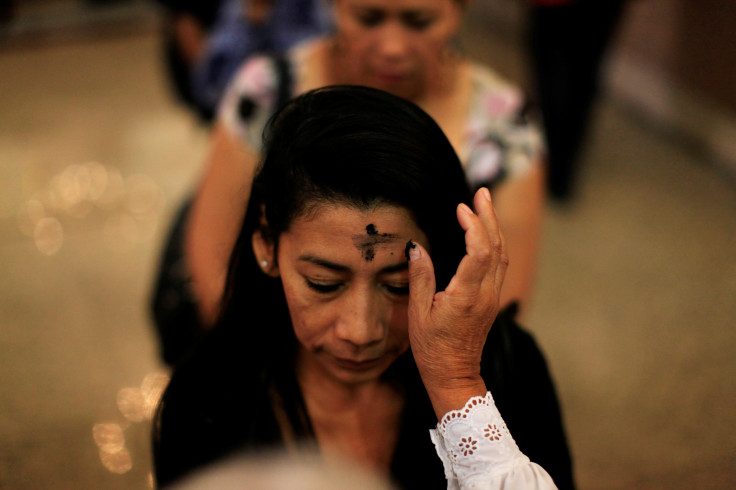Ash Wednesday 2023: Find out why, when and how it is celebrated

KEY POINTS
- This year, Ash Wednesday falls on Feb. 22
- Ash Wednesday is celebrated 40 days before Easter, excluding Sundays
- The placement of ashes on the foreheads during Lent goes back to the 10th century
Ash Wednesday, also known as 'Day of Ashes,' marks the beginning of Lent season. Here's everything you need to know about Ash Wednesday ahead of its celebrations.
What is Ash Wednesday?
Ash Wednesday is a holy day of prayers and fasting celebrated by Western Christian denominations. It is celebrated after Shrove Tuesday and falls on the first day of Lent. The celebration includes the practice of rubbing ashes on one's forehead in the shape of a cross.
The word "Lent" is derived from the English word "lenten" meaning the season of spring. Lent is marked as the season of reflection and preparation and occurs six and a half weeks before the celebrations of Easter.
Lent is commonly observed with ashes, prayer, almsgiving, and fasting for a period of 40 days. During this period, Christians replicate Jesus Christ's sacrifice and withdrawal into the desert for 40 days.
Ash Wednesday in 2023
Ash Wednesday usually falls between Feb. 4 and March 11, depending on the dates for Easter.
This year, Ash Wednesday is on Feb. 22. It is celebrated 40 days before Easter, excluding Sundays. This is because Sundays are traditionally considered feast days, where the resurrection of Jesus Christ is celebrated, therefore, they are not included or counted in the penitential season.
In the early days, the length of the Lenten celebration varied, but eventually it began 6 weeks (42 days) before Easter. This only provided 36 days of fasting not including Sundays. In the 7th century, four days were added before the first Sunday in Lent in order to establish 40 days of fasting.
Fasting on Ash Wednesday and during lent season
Fasting here means consuming only one full meal a day. Two smaller meals that do not add up to a full meal are also permitted. The rules of fasting can vary among Christian traditions.
Catholics who are 14 years and older refrain from eating meat on Ash Wednesday. They also are expected to give up meat on the remaining Fridays during Lent season.
This period of reflection is frequently marked by fasting and giving up luxuries like meat, dairy, chocolate, wine and more.
History of Ash Wednesday
The placement of ashes on the foreheads of Christians while observing Lent dates back to the 10th century and earlier. A more modern tradition of marking the forehead with the sign of the cross, imitates the spiritual seal or mark that Christians get during baptism.
According to experts, the practice of using ashes for public penance dates back much before the concept of Ash Wednesday as we know it today.
According to the St. Gregory Orthodox Church website, in the sixth century, "Those who had been excommunicated for serious sins would stand at the doors of the church dressed in sackcloth and be sprinkled with ashes as penitential psalms were sung. The doors were then shut and the penitents were not received back into the church until Maundy Thursday."
This practice of administering ashes was eventually extended to all Christians over time. However, it is not practised by Orthodox churches or other Eastern Christians.
The significance of the ash
The ashes used for Ash Wednesday are the burnt remains of the palm branches used on Palm Sunday celebrated the year before. Each year, these branches are burned down into a fine powder and mixed with holy water or chrism oil to create a paste.
Ashes represent mortality and penance, and can be given to anyone. When priests administer the ashes, they frequently say something along the lines of, "From dust you came and from dust you will return."
According to Parade, though this exact phrase is not found in the Bible, the concept is mentioned several times. Some of them are as follows:
"All go to one place, all are from the dust, and all turn to dust again." Ecclesiastes 3:20
"Then the Lord God formed man from the dust of the ground and breathed into his nostrils the breath of life, and the man became a living being." Genesis 2:7 (NRSV)
"By the sweat of your face you shall eat bread until you return to the ground, for out of it you were taken; you are dust, and to dust you shall return." Genesis 3:19
"Abraham answered, 'Let me take it upon myself to speak to my lord, I who am but dust and ashes.'" Genesis 18:27
© Copyright IBTimes 2025. All rights reserved.





















